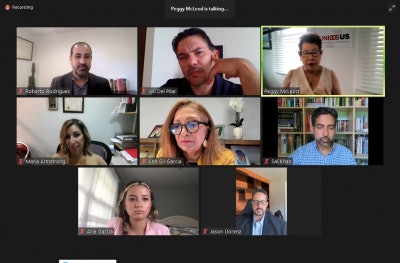Education leaders from UnidosUS, LULAC, The Education Trust, Teach Plus, ALAS, Khan Academy and Leadership for Educational Equity convened virtually this week to discuss how COVID-19 has impacted Latinx students in K–12 and strategize on outcomes so that unfinished learning doesn’t impact these students for a lifetime.
During the panel discussion titled, “The State of Hispanic Education: The Impact of COVID-19 on Students and Families,” Dr. Maria Armstrong, executive director of ALAS, said the pandemic has brought to light many of the issues that have plagued the educational system for quite some time.
“Take a look at how we can perhaps craft policy and really start to create some promising practice to be able use this situation we have been dealing with to come out stronger and better in the end,” she said. 
Key issues throughout the panel discussion were lack of access to high-speed internet, learning loss, lack of representation in the teaching profession (only 9% of teachers are Latinx), changing the deficit mindset to an asset mindset, need for investment in K–12 education, cultural competence and the need to forge a greater connection between families and the education system.
Roberto Rodriguez, president and CEO of Teach Plus, said it is time to bridge the opportunity and achievement gaps in the system.
“As our fastest growing population in our schools, we know that the pandemic has had an even greater impact disproportionately on our Latino families,” he said. “Part of our education response here has to be thinking about how we double down on the stability and the success of our families and provide our Latino students the resources that they need to be able to succeed.”
Dr. Peggy McLeod, deputy vice president of UnidosUS, said it became evident that students suffering most greatly during the pandemic were those with parents who did not speak English.




















